
Mountstuart Elphinstone was a Scottish statesman and historian, associated with the government of British India. He later became the Governor of Bombay where he is credited with the opening of several educational institutions accessible to the Indian population. Besides being a noted administrator, he wrote books on India and Afghanistan. His works are pertinent examples of the colonial historiographical trend.

Thane Creek is an inlet in the shoreline of the Arabian Sea that isolates the city of Mumbai from the Konkan region of the Indian mainland. It comprises the area between Mumbra Retibunder and the Mankhurd-Vashi Bridge. The creek is divided into two parts. The first part lies between Ghodbunder and Thane (Thana), a section from where the Ulhas river flows from the north of Mumbai Island to meet the Arabian Sea on the west. The second part of the waterway lies between the city of Thane and the Arabian Sea at Trombay / Uran, before the Gharapuri islands.

The Port of Karachi is one of South Asia's largest and busiest deep-water seaports, handling about 60% of the nation's cargo located in Karachi, Pakistan. It is located on the Karachi Harbour, between Kiamari Azra Langri, Manora, and Kakapir, and close to Karachi's main business district and several industrial areas. The geographic position of the port places it in close proximity to major shipping routes such as the Strait of Hormuz. It is also ideally located to offer gateway services to the maritime trade for the Central Asian Republics (CARs). The administration of the port is carried out by the Karachi Port Trust, which was established in 1857.

Zaibunnisa Street or Elphinstone Street, is a thoroughfare and a shopping center in central Karachi, Pakistan that courses through Saddar, the city's colonial-era commercial centre.
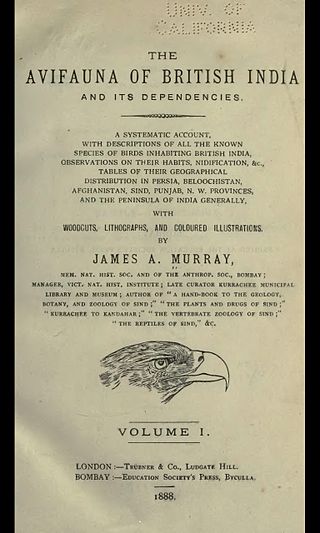
James Alexander Murray was a British zoologist, taxidermist, and museum curator in Karachi. He published several books including one on the edible birds of India and founded the Victoria Natural History Institute at Bombay but went bankrupt, was imprisoned, and died in obscurity.
Sir Robert Bristow was a British harbour engineer best known for his contributions to the development of the port of Kochi (Cochin) in Kerala, India and is regarded as the architect of modern Kochi port. Bristow recounted his experiences in his book Cochin Saga, which is considered an important source of historiography of Kerala. He is also noted for his initiatives in founding the Lotus Club, the first inter-racial club in Kochi. He was also a member of the Royal Society of Arts.

The area of Karachi in Sindh, Pakistan has a natural harbor and has been used as fishing port by local fisherman belonging to Sindhi tribes since prehistory. Archaeological excavations have uncovered a period going back to Indus valley civilisation which shows the importance of the port since the Bronze Age. The port city of Banbhore was established before the Christian era which served as an important trade hub in the region, the port was recorded by various names by the Greeks such as Krokola, Morontobara port, and Barbarikon, a sea port of the Indo-Greek Bactrian kingdom and Ramya according to some Greek texts. The Arabs knew it as the port of Debal, from where Muhammad bin Qasim led his conquering force into Sindh in AD 712. Lahari Bandar or Lari Bandar succeeded Debal as a major port of the Indus; it was located close to Banbhore, in modern Karachi. The first modern port city near Manora Island was established during British colonial Raj in the late 19th century.
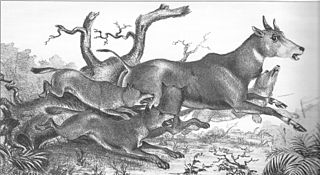
Robert Armitage Sterndale was a British naturalist, artist, writer and statesman who worked in British India before becoming governor general of St. Helena.

The Lansdowne Bridge over the Indus at Sukkur was one of the great engineering feats of the 19th century. The longest cantilever bridge ever built, it had to support the load of heavy steam locomotives. The bridge was inaugurated on 25 March 1889. The Ayub Bridge was built immediately adjacent to the bridge in 1962, to separate the road and Railway traffic. Hence the photographs of the Landsdown Bridge usually also show the Ayub Bridge.
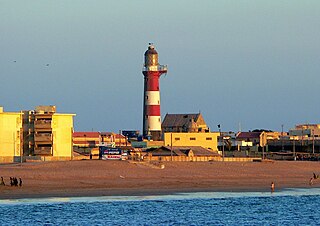
Manora is a small peninsula that forms a protective barrier between Karachi Harbour to the north and the Arabian Sea to the south. Manora, having a total population of 4,273 local residents, was formerly an island, but due to silting is now connected to the mainland by a 12 kilometer long natural sandbridge known as Sandspit. The entrance to Karachi was once guarded against pirate raids by the Manora Fort built in the 1790s, which was later upgraded by the British, and then the Pakistan Navy.

Port Grand Food and drink and Entertainment Complex is a recreational area built in Karachi, Sindh, Pakistan along the waterfront of the 19th century Native Jetty Bridge that connects the Karachi Port Trust to Keamari. The project was a result of joint efforts made by the Karachi Port Trust and a private company Grand Leisure Corporation. The complex was opened for public on 28 May 2011, with then Governor of Sindh, Ishratul Ibad inaugurating the complex. The complex is a hub of shopping, dining, cultural and coastal recreational activities in the city.

The North Mole is a breakwater located in the northern section of Gibraltar Harbour, in the British Overseas Territory of Gibraltar, at the southern end of the Iberian Peninsula. The North Mole, with the rest of harbour, is just north of the east entrance to the Strait of Gibraltar. The breakwater was formerly known as the Commercial Mole, and is the site of the commercial port in the harbour. It was the consequence of a late nineteenth century plan by the British Admiralty to create a modern dockyard and large defensive harbour in Gibraltar.
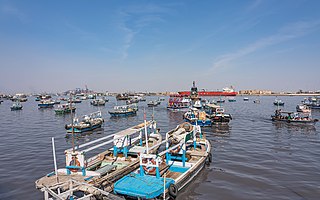
Karachi Harbour is a narrow bay and river estuary located west of the Indus River Delta in Karachi, Pakistan. The harbour lies between the Lyari River delta and Chinna Creek to the north, and the Arabian Sea to the south. Since 1886, sections of the harbour have been improved to form the Port of Karachi - Pakistan's busiest seaport.
The following is a timeline of the history of the city of Karachi, Pakistan.

The demographic history of Karachi of Sindh, Pakistan. The city of Karachi grew from a small fishing village to a megacity in the last 175 years.

Manora Fort is a fort that was built to protect the harbour of Karachi. Originally erected as a mud fortress by the Talpur Mirs in 1797, the fort was captured by the British in 1839 - after which they seized control of Karachi and lower Sindh.

George Parbury (1807–1881) was a British publisher with a special interest in India, a freemason in India and London, Master of Merchant Taylors livery company, Justice of the Peace for two counties and Deputy Lieutenant of the Tower Hamlets.
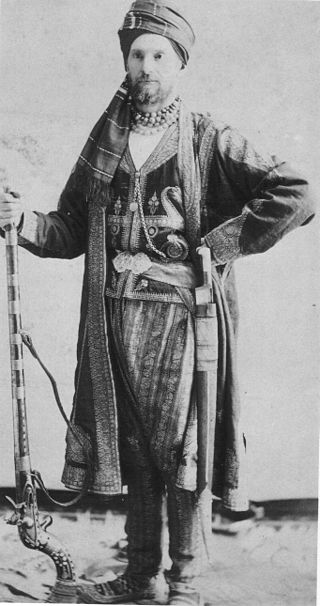
Federico Peliti was a baker, confectioner, hotelier, manager of restaurants in Shimla and Calcutta, and an amateur photographer in British India. His restaurant in Shimla, Peliti's, was very popular and finds mention in numerous writings of the period including those by Rudyard Kipling. A collection of his photographs documenting British Indian life was published in Turin in 1994. He received a bronze medal from the French government in 1889 which entitled him to the title of Chevalier.
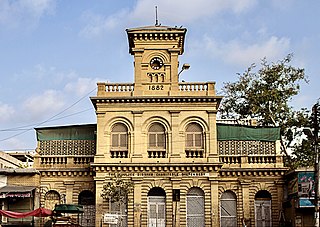
Edulji Dinshaw Dispensary, officially the Eduljee Dinshaw Charitable Dispensary, is a building in the Saddar neighborhood of central Karachi, Pakistan.
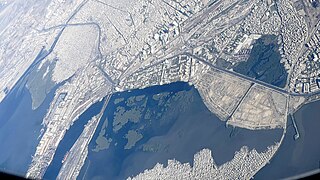
Chinna Creek is a lagoon, within the municipal boundaries of Karachi, on the coastline of the Arabian Sea, located in the south-west region of Sindh, Pakistan.



















